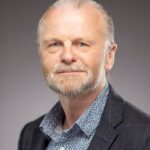You don’t need to be at the cutting edge of learning and development to keep pace with change. But staying up to date with the latest trends, experimenting with new tools and empowering others to do so will enable the function to turn the dial on learning effectiveness.
There have been some interesting discussions in my professional social media channels lately, about the position and role of learning and development.
Are we part of human resources? Or organisational development? Are we a function in our own right? How do we relate to the rest of the organisation? What skills do we need in the business world of today and tomorrow? How do we get the mythical ‘seat at the table’?
But guess what? We’ve been having these same debates since I joined the ‘training’ world back in 1990.
And we’re still here. And we’re still functioning.
Here and now
In mid-February, I was at the Learning Technologies Conference and Exhibition at ExCel, London. I attended – and chaired – some great sessions. I visited the vibrant and packed exhibition. I met and chatted with many of my professional peers. Things looked pretty buoyant to me.
What I did detect, however, was a sense of expansion, reflection, relaxation and consolidation. I heard many people say something to the effect that they weren’t seeing anything new since last year. I wrote a quick blog about this after I got home.
If it is truly the case that we have reached a functional and technological plateau in learning and development, then is this not the ideal time for L&D to be reflecting on the journey thus far, on the changes that we have seen and experienced, and – as I say in my blog – to colonise, build on and develop that plateau?
Change
The single biggest change I have seen in the role of L&D in recent years has been the recognition that we DON’T exist in a self-righteous exclusion zone, embattled, unloved and misunderstood. Instead, we are now moving towards seeing ourselves – and being seen – as trusted business contributors, adding value to and contributing to the business aims, objectives and bottom line.
How and why has this change started to happen?
I’d suggest that a sufficient ‘critical mass’ of credible practitioners has peered over the top of and stepped out of their foxholes. These are professionals who are able to demonstrate a collaborative, consultative, partnership approach to their stakeholders and their work; professionals who have amassed sufficient evidence in the workplace to be able to back up the effectiveness of this approach.
I’m proud to have many of these people in my professional/personal learning network, my PLN, if you will. I rely on their wisdom, their experience and their sharing via social media and other professional channels like TrainingZone. They operate honestly and openly. They share their highs and lows, their successes and, more revealingly, their mistakes.
I am seeing and hearing an increasing number of practitioners prepared to debate their current and developing practice openly in social media and public forums like the weekly #LDinsight tweetchat on Twitter, hosted by the @LnDconnect group, or as shared by many speakers at the Learning Technologies Conference last month.
The general trend seems to be an agreement that the way forward is closer alignment with our stakeholders to achieve a measurable personal/professional development shift and resulting business improvement.
It’s not about jumping onto the latest shiny tech bandwagon.
Shift
So if it’s not that, what is it? I contend that it’s a mind shift, a letting go. It’s giving up on being the expert on delivering learning programmes; letting go of that self-limiting self-perception and trying out some of the many new tools, techniques and thinking about personalised, social and collaborative learning and performance support that others are already using. Learn from them, their experiences and, critically, their data-verified results.
Look to the Learning & Performance Institute’s recently updated Capability Map, the CIPD New Profession Map and/or the Towards Maturity 2019 Annual Research Report ‘The Transformation Journey‘. All of these point towards more flexible, multi-skilled L&D functions, teams and individuals, who can confidently flex between and amongst different approaches and tools in support of enabling people to perform better.
And that means being braver, more playful, experimental and open. Go under the radar and test out some of that new stuff. Set yourself or your team challenges to find out more and report back. Make each of them responsible for exploring, learning about and prototyping or piloting tools with willing partners.
Surprise yourself and your stakeholders by re-imagining the use of some of the tools you’ve already got but maybe haven’t considered before, and for which there may well now be more opportunities to leverage their function and purpose.
A little about a lot
I’m not the deepest thinker about all this stuff. What I am is a pragmatic practitioner. Over some thirty years in L&D, I have been a trainer, a training manager, a ‘Head of L&D’, a learning technologist and a ‘Head of Learning Technologies’.
Now, I’m an independent L&D consultant, an accreditation mentor with the Learning & Performance Institute and I have a part-time assessor/tutor role on the Digital Marketing Apprenticeship programme at a local college. Along the way, I gained some qualifications and lots of experience. I learned from my mistakes.
Essentially, the job was the learning – and it still is.
I have never been at the bleeding edge of L&D, IT or learning technologies. But I’m interested. I’m nosy. I keep my ear to the ground. I pay attention to what’s going on around me, and I listen to the voices and experience of my PLN, my professional bodies and others who have done the academic, theoretical and deep work which lights our way ahead.
I try to keep abreast of new trends, techniques and technologies in learning & development. But I also recognise that I can’t know everything, nor, quite frankly, do I want to.
Nor should you. It’s not enough to know what’s going on in our profession and in the wider business world. We must be able to translate that for our colleagues, set direction, and empower our people to refine and improve practice in the areas where we can make the most difference to our stakeholders and business outcomes.
It’s OK to have specialist knowledge and experience, but it’s also critical to understand the bigger picture and to have the confidence to step up and support their needs in the most appropriate and effective ways we can.
Here’s to the future.
You don't need to be at the cutting edge of learning and development to keep pace with change. But staying up to date with the latest trends, experimenting with new tools and empowering others to do so will enable the function to turn the dial on learning effectiveness.
There have been some interesting discussions in my professional social media channels lately, about the position and role of learning and development.
Are we part of human resources? Or organisational development? Are we a function in our own right? How do we relate to the rest of the organisation? What skills do we need in the business world of today and tomorrow? How do we get the mythical 'seat at the table'?
But guess what? We've been having these same debates since I joined the 'training' world back in 1990.
And we're still here. And we're still functioning.
Here and now
In mid-February, I was at the Learning Technologies Conference and Exhibition at ExCel, London. I attended – and chaired – some great sessions. I visited the vibrant and packed exhibition. I met and chatted with many of my professional peers. Things looked pretty buoyant to me.
What I did detect, however, was a sense of expansion, reflection, relaxation and consolidation. I heard many people say something to the effect that they weren't seeing anything new since last year. I wrote a quick blog about this after I got home.
If it is truly the case that we have reached a functional and technological plateau in learning and development, then is this not the ideal time for L&D to be reflecting on the journey thus far, on the changes that we have seen and experienced, and – as I say in my blog – to colonise, build on and develop that plateau?
Change
The single biggest change I have seen in the role of L&D in recent years has been the recognition that we DON'T exist in a self-righteous exclusion zone, embattled, unloved and misunderstood. Instead, we are now moving towards seeing ourselves – and being seen – as trusted business contributors, adding value to and contributing to the business aims, objectives and bottom line.
How and why has this change started to happen?
I'd suggest that a sufficient 'critical mass' of credible practitioners has peered over the top of and stepped out of their foxholes. These are professionals who are able to demonstrate a collaborative, consultative, partnership approach to their stakeholders and their work; professionals who have amassed sufficient evidence in the workplace to be able to back up the effectiveness of this approach.
I'm proud to have many of these people in my professional/personal learning network, my PLN, if you will. I rely on their wisdom, their experience and their sharing via social media and other professional channels like TrainingZone. They operate honestly and openly. They share their highs and lows, their successes and, more revealingly, their mistakes.
I am seeing and hearing an increasing number of practitioners prepared to debate their current and developing practice openly in social media and public forums like the weekly #LDinsight tweetchat on Twitter, hosted by the @LnDconnect group, or as shared by many speakers at the Learning Technologies Conference last month.
The general trend seems to be an agreement that the way forward is closer alignment with our stakeholders to achieve a measurable personal/professional development shift and resulting business improvement.
It's not about jumping onto the latest shiny tech bandwagon.
Shift
So if it's not that, what is it? I contend that it's a mind shift, a letting go. It's giving up on being the expert on delivering learning programmes; letting go of that self-limiting self-perception and trying out some of the many new tools, techniques and thinking about personalised, social and collaborative learning and performance support that others are already using. Learn from them, their experiences and, critically, their data-verified results.
Look to the Learning & Performance Institute's recently updated Capability Map, the CIPD New Profession Map and/or the Towards Maturity 2019 Annual Research Report 'The Transformation Journey'. All of these point towards more flexible, multi-skilled L&D functions, teams and individuals, who can confidently flex between and amongst different approaches and tools in support of enabling people to perform better.
And that means being braver, more playful, experimental and open. Go under the radar and test out some of that new stuff. Set yourself or your team challenges to find out more and report back. Make each of them responsible for exploring, learning about and prototyping or piloting tools with willing partners.
Surprise yourself and your stakeholders by re-imagining the use of some of the tools you've already got but maybe haven't considered before, and for which there may well now be more opportunities to leverage their function and purpose.
A little about a lot
I'm not the deepest thinker about all this stuff. What I am is a pragmatic practitioner. Over some thirty years in L&D, I have been a trainer, a training manager, a 'Head of L&D', a learning technologist and a 'Head of Learning Technologies'.
Now, I'm an independent L&D consultant, an accreditation mentor with the Learning & Performance Institute and I have a part-time assessor/tutor role on the Digital Marketing Apprenticeship programme at a local college. Along the way, I gained some qualifications and lots of experience. I learned from my mistakes.
Essentially, the job was the learning – and it still is.
I have never been at the bleeding edge of L&D, IT or learning technologies. But I'm interested. I'm nosy. I keep my ear to the ground. I pay attention to what's going on around me, and I listen to the voices and experience of my PLN, my professional bodies and others who have done the academic, theoretical and deep work which lights our way ahead.
I try to keep abreast of new trends, techniques and technologies in learning & development. But I also recognise that I can't know everything, nor, quite frankly, do I want to.
Nor should you. It's not enough to know what's going on in our profession and in the wider business world. We must be able to translate that for our colleagues, set direction, and empower our people to refine and improve practice in the areas where we can make the most difference to our stakeholders and business outcomes.
It's OK to have specialist knowledge and experience, but it's also critical to understand the bigger picture and to have the confidence to step up and support their needs in the most appropriate and effective ways we can.
Here's to the future.









2 Responses
Thanks for this thoughtful
Thanks for this thoughtful and informative piece Niall. Having started our company 30 years ago, there’s a lot that you say that resonates with my own experience. I like the balance between being open to new ideas and techniques and balancing that with some wisdom around faddism.
Yours, a fellow-traveler and seeker.
Michael
Michael,
Michael,
Thanks for that feedback. Taking time to reflect and get really good at some of what we do, whilst paying attention to and experimenting with what and where others are doing or heading, has the potential to make the biggest difference, I believe.
Interesting times. N.